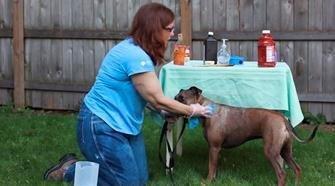FOR IMMEDIATE RELEASE | August 26, 2013
What to do if your dog gets ‘skunked’ wins American Chemical Society video contest
WASHINGTON, Aug. 26, 2013 — A lesson on what to do if your dog gets “skunked” has won a video contest sponsored by the American Chemical Society (ACS), the world’s largest scientific society, to showcase the uses of chemistry in everyday life, and celebrate the 90th anniversary of its weekly newsmagazine, Chemical & Engineering News (C&EN).
The winning video and four runners-up will be available at www.BytesizeScience.com, with one video going live daily this week.
A panel of judges selected the top 5 videos from among more than 30 of entries from the United States, Canada, South Africa and other countries. ACS invited scientists, students and others to produce videos that highlight the chemistry in everyday life as part of its Chemistry Ambassadors initiative to communicate chemistry to the public and policymakers.
Judges ranked the videos on clarity and accuracy in explaining chemistry, relevance to everyday life, entertainment value/creativity of the submission, and execution and production value.
They selected as winner an entry from Sally B. Mitchell, a chemistry teacher from East Syracuse Minoa High School in Syracuse, N.Y. The prize is a trip to the 246th ACS National Meeting & Exposition in Indianapolis. It features almost 7,000 presentations on new discoveries in science and other topics.
In addition to Bytesize Science, the videos will be featured in C&EN, on ACS’ Bytesize Science channel, on the acs.org homepage and in a profile on the ACS’ Chemistry Ambassadors webpage.
The top five videos:
- “What to do if your dog gets skunked,” Submitter: Sally B. Mitchell, chemistry teacher, East Syracuse Minoa High School
- “Fun facts about household items,” Submitter: Kayla Briët, high school student
- “Fresh bread of Bel-Air,” Submitter: Tien Nguyen, doctoral candidate, University of North Carolina-Chapel Hill, Organic Division
- “How does vision work,” Submitter: Chad Jones, graduate student, Brigham Young University
- “How diapers work,” Submitter: Jason W. Ribblett, Student Affiliates of the ACS co-faculty advisor, Ball State University
For more entertaining, informative science videos and podcasts from the ACS Office of Public Affairs, view Prized Science, Spellbound, Science Elements and Global Challenges/Chemistry Solutions.
# # #
The American Chemical Society is a nonprofit organization chartered by the U.S. Congress. With more than 163,000 members, ACS is the world's largest scientific society and a global leader in providing access to chemistry-related research through its multiple databases, peer-reviewed journals and scientific conferences. Its main offices are in Washington, D.C., and Columbus, Ohio.
Media Contact
Michael Bernstein
m_bernstein@acs.org
202-872-6042
Michael Woods
m_woods@acs.org
202-872-6293

High-resolution image

